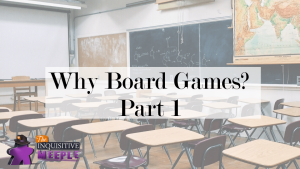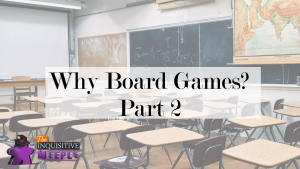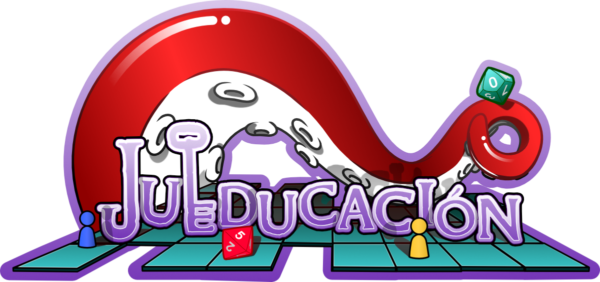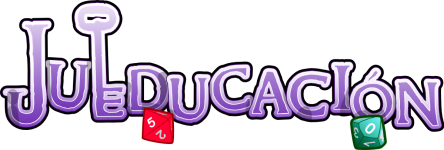Gracias a Helaina Capel de KTBG games y de su amabilidad y cercanía sobre mis comentarios y crónicas sobre el uso de uno de sus juegos Haunt the House y del dossier de uso en el aula que había creado (que os animo a descubrir en la sección de Materiales Descargables) me puso en contacto con Ryan Sanders de la web The Inquisitive Meeple en la que se publicó en dos partes un pequeño artículo sobre mi visión de uso de juegos y en concreto del Haunt the House en las aulas bajo el título de Why Boardgames? que os he recopilado aquí.
Os invito a que entrar en la web de KTBG para descubrir sus otros proyecto y en la de Ryan para después ir a https://www.adventuresingameschooling.com/ en la que encontraréis muchas sorpresas.
Aquí los links originales:
https://www.inquisitivemeeple.com/why-board-games-part-1/
https://www.inquisitivemeeple.com/why-board-games-part-2/meeple.com/why-board-games-part-2/
«Oscar is a school teacher in Asturias (a region in northwest Spain) where he uses board games in his teaching of English as a foreign language.
Why Board Games? –by Oscar Recio Coll -published, February 14, 2019
As a school teacher and after using board and roleplaying games as teaching tools since 2002-2003 I can tell how games have a positive effect on the learning process.
 As EFL (English as a foreign language) teacher I used games as a way to introduce something that usually we, the teachers, forget to present: Why we need to learn and why the content-dexterity-knowledge is useful. Yep…we, I’m 42, learnt “because the teacher said it” and that was all…but the lack of a goal (apart from passing a test) put the whole focus away from the real core of learning: understanding and be able to see the connection with something that can be useful out of the school environment.
As EFL (English as a foreign language) teacher I used games as a way to introduce something that usually we, the teachers, forget to present: Why we need to learn and why the content-dexterity-knowledge is useful. Yep…we, I’m 42, learnt “because the teacher said it” and that was all…but the lack of a goal (apart from passing a test) put the whole focus away from the real core of learning: understanding and be able to see the connection with something that can be useful out of the school environment.
Just think about how you experienced your learning process when you’ve been at school…aha, I can see your faces…exactly…you learned “by Faith”. And “by Faith” I mean because the teacher said that was important and families and you-the student- didn’t need anything else…well…maybe understanding how the content is used away from the context of the classroom would have been important to make you a bit more motivated, don’t you think so?
Let’s think about something like…mmmm…. algorithms for example (if you are a Math teacher please, “don’t kill the messenger”). I’m sure that probably your teacher didn’t tell you WHY and HOW such content like Algorithms was important for your everyday life, how they were used and why even when you won’t be using them at your Secondary school years it’s a knowledge so important you can’t run away from it because it’s ingrained in computers, Google maps or something like Pokemon Go. Presenting a fact where the knowledge is applied makes the student understand WHY this content is part of his/her school curriculum. A knowledge which is far beyond his/her actual application when being a Secondary student is present on a daily basis even when he/she isn’t aware of its presence and impact. It happens a lot, right? Well, at least when I was a student happened a lot. Connections between real life and school were quite unusual…only when practicing a language…Just a few teachers presented the connections to “reality” of their subjects…
Another example: Syntax…yes, I know…but surely you will see that knowing how a text is “build” will change drastically the way you understand it and maybe could reflect the way you are going to react to it. Think about the legal language or just when you need to make a complaint letter, asking for a Tax refund or sorting out the “gaps” of a contract that could make you sign the wrong conditions for a job. Suddenly the knowing and understanding of a “boring” knowledge acquires an importance that reflects the use and goal of learning far beyond the “passing of a test”.

Games ALWAYS present the goal of learning “things”. When you are playing any kind of game the rules, background in which is set, the mechanics that enable the game to progress and move forward are presented so clearly that players understand why, how and when apply the rules, the knowledge and dynamics needed to play and, this is important, why LEARNING certain skills, knowledge, and mechanics will make them win, progress, be successful or be able to face any other challenge they will need to overcome. Games are powerful tools for teaching, not THE tools but certainly a fantastic tool to evidence how and why you need “something” to move forward.
As I mentioned I teach EFL and I try hard to remember my student years and how was my experience through all my Primary, Secondary and University…the path was long and I can assure that only 10-15% of the teachers I’ve had told us WHY and HOW the knowledge and skills they tried to teach could be applied on our future jobs as teachers or in everyday life…or as citizens!! I can teach long vocabulary lists to my students…they need to know vocabulary…it’s essential. Knowing words will make them easier to interact with the context in which they will be living, especially if you are living far away from your country. And yes, teaching the supermarket items, classroom stuff, family, how to tell the time, asking politely how to go from place A to place B and so on are basic things they will need but…but…well…some of them are far away from really needing that knowledge in the near future and I need them to get involved in something like NEEDING to use the language. Imagine teaching grammar structures…they need to find a real, practical and useful way to see grammar as a must and not only as a “fill in the blanks” task.
My basic principles and first steps are using board games: communicative requirements are easily absorbed and used. The vocabulary and grammar structures are, normally, far beyond the usual level presented on the official curriculum set by the Education Departments for the level in which I use them but they don’t care and they understand WHY they need a foreign language. If they are not using the foreign language there’s no way to interact with the game…and I can tell you something: they WANT to play…oh yes, they really want to play.
When you present a board game your students have never seen before using a foreign language their brains “accept” the fact the game can’t be played using another language…and that’s what you are looking for…the vocabulary needed to play that game plants its seeds and will be growing through the different sessions and establishing communicative structures thanks to the interaction of the 4 skills: Reading (rules), Listening and Speaking (social interaction) and even Writing if the games ask for it or maybe because the game is “asking” for “new rules” or an “expansion”.

Of course, …I know…we, the teachers, will be designing and making the needed adaptations to make it meaningful for our group and for the criteria in which we need to frame the using of games as teaching tools.
Games are fantastic tools to dynamize contents…and yes, when you link contents to games the evaluation also will be appearing. Games can be used as an evaluation tool.
Another advantage is the more games they’ll be playing the more vocabulary they will interiorize and the stronger their communicative structures will be.
Games offer other strong points we need to emphasize: practice, mistake and test anxiety management.
A game session is offering a chance to use what you know, make mistakes, “failing” or “epic failing” becoming as a part of the game experience and, very important, have fun…so you’ll be willing to play again to become a better or more competent player or just to try to do it better because you want to achieve the goal the game is asking you to fulfill.
How students manage mistakes is absolutely vital, how they face and address frustration, following and breaking the rules and how the other players oversee the applications of them. These elements are the core of a playing environment and how players evolve and learn through games.
As Einstein said: “Learning is an experience. Everything else is just information”.
 Imagine a boy from Spain, a 12-year-old kid discovering the Gabriel Knight and Monkey Island video games, Dungeons & Dragons, The Call of Cthulhu, Space Hulk, Warhammer fantasy roleplay and many more… He needed a foreign language to play…what he did? Learn. That was the only way to experience what the others were “living.”
Imagine a boy from Spain, a 12-year-old kid discovering the Gabriel Knight and Monkey Island video games, Dungeons & Dragons, The Call of Cthulhu, Space Hulk, Warhammer fantasy roleplay and many more… He needed a foreign language to play…what he did? Learn. That was the only way to experience what the others were “living.”
His older brother played those games and they were exciting, he was there when his brother played with his friends, listened to the people playing when using the vocabulary of the games and read the rulebooks when his brother was not at home…oh yes, …he learned…because he wanted to play…and yes, that kid was me. And changed my experience when foreign language was a subject at school…
So now picture a classroom and bringing a game they have never seen before…if you can make your group interested to play THAT game, you’ll see how much the dynamics of learning vocabulary or anything the game is asking for will be appearing. They´ll become more and more engaged and also you can present more formal contents and make them aware of how their playing sessions are having an impact on the way they are improving on the “traditional” FL learning sessions. The transference of knowledge and the way their communicative skills are getting better could make them feel motivated to face new “challenges” both formal and informal. Feedback becomes the source of information as the sessions are used as teaching tools and it’s the way to make the adaptations or redesigning the approach used to make the game a path for learning a certain content. The context and background are telling you what to do. The way the group reacts to how you presented the game, the content you are trying to work through playing and how fast they are able to “play” without your guidance is evidence of the individual and group capability to absorb the required information to actually play that game. Social interaction plays a vital role too, the previous experiences and knowledge are used to take profit of the new situation.
As I mentioned before: as you play the amount of vocabulary and communicative structures are growing and growing, reinforcing the previously learned and setting the foundations of a better and more efficient way to address communication. From time to time a session of “serious” feedback is needed because is easy, really easy, to lose control of a game-based-session if you are not careful.
 Games, at least the way I use them to teach, are always presented with the content to be learned…well, maybe not at the time I’m presenting the game, but for sure at the time I’ll be presenting the “formal” content hidden within the using of that game. Awareness of the “layers” a game has is something essential for me.
Games, at least the way I use them to teach, are always presented with the content to be learned…well, maybe not at the time I’m presenting the game, but for sure at the time I’ll be presenting the “formal” content hidden within the using of that game. Awareness of the “layers” a game has is something essential for me.
Kids, when exposed to those “layers”, could understand how games are powerful…c’mon…just remember Season 1 of Stranger Things and remember how they used strategy learned when they played D&D and how they transferred a fictional background and decisions made to real life situation…Ok…I know…it’s fiction…but you know what I’m talking about, right? Companies, the Army, banks, and scientists use the same process when planning how to address a probably future problem or stress situation: is called simulation.
Oh, wait a minute…so…they are “playing” but without a board game…. They suddenly have a challenge to face, within a safe context, using a mistake-friendly environment as a way to improve, using a background they know, with skills they are practicing and with the goal to better face a future real situation…aha…Can you see what I’m talking about?
I need to make my students aware of how a game is an excellent opportunity and tool to learn…my students “lived” the adventures of Guybrush Threepwood and became masters of “Insult Swordfighting” defeating Carla and LeChuck, barely survived the Horror on the Orient Express campaign for The Call of Cthulhu roleplaying games while visiting Europe and learning how the world changed from 1923 to the present age, sailed the seas of Thea playing the 7th Sea RPG and explored the Pirate way of living, escaped from Atlantis island and learned geography, learned European political geography with The Fury of Dracula, became detectives with Awkward Guests, explored the Third Horizon with Coriolis and thought about what means to start a living far from home, will deal with the evil plans of the Nemesis Society on the Rise of Moloch, the dungeons of Dark Souls: The Board Game, survive the exploring of Forbidden Island, built cities and learnt about politics with Carcassone and Catan; feeling what means to be a part of a pack through Werewolf: the Apocalypse RPG and being aware of how our planet is suffering and how having a “tribe” or family is important, changing the History of middle ages becoming a vampire in the Dark Ages…and many more projects I have adapted or I’m adapting for Primary and Secondary stage…
One of the last challenges was using a fantastic game I found thanks to Kickstarter and that made me “fell in love” with the potential it had to be used at school and especially in my foreign language class.
 The game was Haunt the House.
The game was Haunt the House.
I could use it to teach vocabulary: my 1st graders: colors, shapes, the difference between Big and Small, emotions (scared, terrified, happy…), 2nd and 3rd grade for items, clothes, jobs…OMG, it was full of contents to work at school… 4th and 5th grades for rooms, describing people, using of grammar structures, verbs…and obviously, with 6th graders all that was mentioned before…and working on cultural aspects of a foreign language as traditions, its origins and impact because Halloween is present within the game in a way that playing the game could be part of the school calendar and the teaching activities prior to Halloween week, on Halloween and after it to make a review and even a reading-writing test…oh yes…my EVIL GRIN MODE was ON.
And even more: all those contents could be moved from one grade to another one with just one material such as a board game…well, yes…the only “bad thing” was I only bought one…and I really needed 3 of them…sniff, sniff…
2 weeks or so before Halloween I showed to my 4th-5th and 6th graders the box, told a few details, presented the different components and explained how to play…the “Booing” part of the game was their favorite!!!
I prepared a little handout as a “Speaking Reference Chart” to make them able to read a brief summary of the Set Up and how the Game Turn was scheduled…included a few structures they needed to use as the speaking requirements to interact with the game and that was all…
Excitement grew stronger as the days passed…the box was in class some days…when I “forgot” the game at home my students asked where it was…and that was how I made the atmosphere for using the game an ingredient to the teaching-learning experience…yuk, yuk, yuk…

The Halloween week arrived and we actually played the game: my students dressed as monsters playing a game in which they impersonate Ghosts…just imagine how fun it was!!!
The game was played slowly in the beginning. The practicing of the vocabulary and the required grammar structures to interact with the games and players showed which gaps I needed to work on after the session.
I was able to evaluate the Reading and Speaking skills, how Listening played an important role on the reactions of players to the dynamics the game is using and checking at the same time- how vocabulary and previous knowledge were used. All with only a board game.
Why use games? The answer is simple: Why not.

